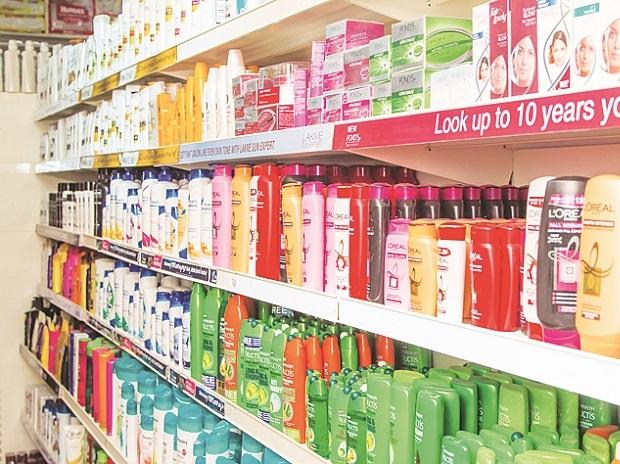Beauty Takes Back Seat As Essential Items Become Priority Amid Lockdown

A common trend visible at most supermarkets and kiranas these days is the rush for food and essential items. Beauty and personal care products, including cosmetics, skin creams, hair oils and lotions have all been ignored for now, implying a sales hit for companies operating in the space.
Results of some top personal care players including names such as Hindustan Unilever (HUL) and Marico show the impact clearly. And market research agency Nielsen too validates the trend. In its January-March (Q4) quarterly update released last week, Nielsen said that non-foods, led by categories such as beauty and personal care, had reported a decline of 0.8 per cent in March as the focus shifted to stockpiling essentials in the first phase of the lockdown.
The decline comes in a weak market, explains Prasun Basu, president, South Asia, Nielsen. “There was already a deceleration that discretionary categories were seeing because of the general consumption slowdown. The Covid-19 crisis has only exacerbated the situation,” he said.
ALSO READ: Ratan Tata picks up stake in an 18-year-old's pharmaceutical start-up
For the entire January-March period, non-foods reported a growth rate of 1.8 per cent only, down from 3.8 per cent in October-December 2019. In contrast, foods reported a 6.2 per cent growth rate in March, 7.8 per cent in the March quarter and 8.3 per cent in the December quarter.
Nielsen says that April growth numbers for food and non-foods will continue to show a sharp divergence, in line with what was visible in March, since the lockdown continued through the month. Analysts say that the tendency to conserve cash, seek value and stick to basic needs and categories will drive consumption for the next few quarters. The shift in preference for essentials therefore has prompted HUL and most other personal care companies to focus more on health and hygiene. HUL’s Chief Financial Officer Srinivas Phatak said last week that more products in the hygiene space would be launched by the company in the coming weeks.
ALSO READ: Petition filed in Kerala HC against mandatory download of Aarogya Setu
Analysts also attribute the shift to the sharp decline in Q4 revenue and profit of HUL’s beauty and personal care segment, its biggest contributor to topline and bottomline.
In Q4, HUL reported a 13.5 per cent revenue decline in beauty and personal care versus a year ago, while segment profit was down 22.5 per cent and margins contracted by 291 basis points versus last year. One basis point is one hundredth of a percentage point.
On an average, beauty and personal care contributes 46 per cent and 58 per cent to HUL's topline and bottomline. In Q4, this was down to 44 per cent and 56 per cent respectively.
The trend is no different for Marico. Q4 results show that the Parachute coconut oil portfolio reported an eight per cent sales volume decline and a 12 per cent decline in terms of sales value for the period.

ALSO READ: Famotidine shortage in US may benefit Indian pharmaceutical companies
All these categories contribute 80 per cent in terms of turnover, said analysts, to Marico's India business. The latter (India business) contributes 77 per cent to Marico's overall topline. 23 per cent comes from international operations.
In a post-results update, Saugata Gupta, Marico's managing director and chief executive officer, said that the lockdown had contributed to underperformance of its discretionary categories (such as hair oils, male grooming and premium hair nourishment).
But analysts say that a cutback in discretionary spends, which has got worse during the lockdown, will continue to weigh on Marico's business for the next few quarters. Like HUL, Marico too has been investing in emerging categories to recover sales. Gupta said that the company had launched Mediker hand sanitisers and a fruit and vegetable cleaner (called Veggie Clean) in April, with more launches lined up ahead.
Mohit Malhotra, chief executive officer, Dabur India, said offtake of Chawanprash, honey and health supplements had been more during the lockdown versus hair oils, whose offtake remained weak. The attention, he says, will continue to be on health, hygiene and immunity boosters.
Stablecoin The Future Of Currency?
The payments system is undergoing a quiet but consequential shift. What was once the exclusive preserve of central banks... Read more
BoE Loosens Capital Rules
The Bank of England has taken a significant step towards easing post-crisis regulation by lowering its estimate of the c... Read more
Monzo Looks For US Banking License
Monzo is preparing a renewed push to secure a US banking licence, four years after abandoning its first attempt when tal... Read more
Crypto Firms Push Into US Banking
America’s cryptocurrency companies are scrambling to secure a foothold in the country’s traditional banking system, ... Read more
Parallel Banking: Stablecoins Are Now Global
Parallel Banking: How Stablecoins Are Building a New Global Payments SystemStablecoins—digital currencies pegged to tr... Read more
JPMorgan Deploys AI Chatbot To Revolutionize Research And Productivity
JPMorgan has deployed an AI-based research analyst chatbot to enhance productivity among its workforce, with approximate... Read more

